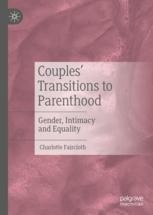In this strand of our research, we are interested in exploring the impact of parenting culture on family intimacy – that is, how does the transition to a more expertise-based idea of ‘doing relationships’ affect the ways in which individuals relate to each other in day-to-day family life? How, in particular, does it change the ways in which members of the parental couple relate to each other? Does the experience of same-sex couples have anything to tell us about the ways in which parenting culture is gendered? How does this relate to working patterns? How is adult-child intimacy re-conceived in light of shifts in parenting culture?
Charlotte Faircloth’s Leverhulme funded research Parenting: Gender, intimacy and equality (Leverhulme Trust, Early Career Fellowship 2011-2014) has been been particularly concerned with the way in which the ‘new parenting culture’ has affected adults’ experiences of raising their children, and the implications of this has had on their own sense of self, or ‘identity work’.
You can read Charlotte Faircloth’s article ‘When equal partners become unequal parents: couple relationships and intensive parenting culture in Families Relationships and Societies for free – this was one of the top 5 most read articles in FRS in 2020. Charlotte’s book Couples’ Transitions to Parenthood: Gender, Intimacy and Equality has also recently been published by Palgrave.
 This book argues that new parents are caught in an uncomfortable crossfire between two competing discourses: those around ideal relationships and those around ideal parenting. The author suggests that parents are pressured to be equal partners while also being asked to parent their children intensively, in ways markedly more demanding of mothers. Reconciling these ideals has the potential to create resentment and disappointment. Drawing on research with couples in London as they became parents, the book points to the social pressures at play in raising the next generation at material, physiological and cultural levels. Chapters explore these levels through concrete practices: birth, feeding and sleeping—three of the most highly moralised areas of contemporary parenting culture.
This book argues that new parents are caught in an uncomfortable crossfire between two competing discourses: those around ideal relationships and those around ideal parenting. The author suggests that parents are pressured to be equal partners while also being asked to parent their children intensively, in ways markedly more demanding of mothers. Reconciling these ideals has the potential to create resentment and disappointment. Drawing on research with couples in London as they became parents, the book points to the social pressures at play in raising the next generation at material, physiological and cultural levels. Chapters explore these levels through concrete practices: birth, feeding and sleeping—three of the most highly moralised areas of contemporary parenting culture.
You can watch Charlotte speaking about this research here
Charlotte Faircloth and Esther Dermott took part in the event ‘Gender, Equality and Intimacy: (Un)comfortable bedfellows?’ which Charlotte co-organised with Dr Katherine Twamley at the IOE in London, on 7th April 2014; you can read the SRO Special Issue from that event here
Charlotte Faircloth and Katherine Twamley also co-organised an event (with David Frost) in 2018 on the subject of ‘Intersections of Intimacies and Inequalities’. Further info here
Reading suggestions (click here for more info on selected titles)
Collins, M. 2003. Modern Love: An Intimate History of Men and Women in Twentieth-Century Britain London: Atlantic Books
Fox, B. 2009. When Couples Become Parents: The Creation of Gender in the Transition to Parenthood. Toronto: University of Toronto Press.
Dermott, E. 2008. Intimate Fatherhood: A sociological analysis. London: Routledge
Gabb, J. 2010. Researching Intimacy in Families. London, Palgrave Macmillan.
Gabb J. (forthcoming 2013) ‘Embodying risk: managing father–child intimacy and the display of child nudity in families’, Sociology
Gabb J. (2004) ‘”I could eat my baby to bits”. Passion and desire in lesbian mother-children love’, Gender, Place Culture. Special issue on Emotional Geographies, Vol. 11(3): 399-415.
Hochschild, A. 2003. The Commercialization of Intimate Life. Notes from Home and Work. Berkeley and London: University of California Press.
Illouz, E. 2007. Cold Intimacies: The Making of Emotional Capitalism. Cambridge: Polity
Jamieson, L. 1998. Intimacy: Personal relationships in modern societies. Cambridge: Polity Press
Sikes, P. and Piper, H. 2009. Researching Sex and Lies in the Classroom. London, Routledge
Smart, C. 2007. Personal Life: New Directions in Sociological Thinking. Cambridge, Polity.
Smyth, L. 2008. “Gendered Spaces and Intimate Citizenship: the case of breastfeeding” European Journal of Women’s Studies15.2 (2008): 81-96. Abstract
Swidler, A. 2001. Talk of Love. How Culture Matters. London: University of Chicago Press.
You can see presentations by Charlotte Faircloth and Esther Dermott at the CPCS seminar ‘Gender and parenting culture: Intensive fatherhood?’ via this page and information about a panel on ‘Childcare, trust and intensive parenting’ featuring Esther Dermott, Jennie Bristow, Carol Vincent, Heather Piper and Alison Garnham at the CPCS event Changing Parenting Culture here.
